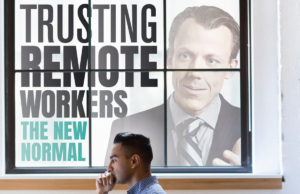By Jacob Wolinsky. Originally published at ValueWalk.

Americans tend to enjoy their jobs more when they are free from pressure. As more companies cater to the comfortability of remote workers, Americans are increasing their engagement with the style of work. In 2019, 1 in 10 Americans worked from home at least one time each week; however, the pandemic has caused those numbers to spike. Resulting from this, it has been found that remote work has a fleet of benefits for both employers, employees, the environment, and the economy. Furthermore, it has been found that the most valuable outcomes of remote work are discovered when employees feel trusted. In other words, with an emphasis on trust, remote teams are destined to thrive and survive.
Q1 2020 hedge fund letters, conferences and more
The Psychology Of Trusting Remote Workers
However, over half of business owners feel their business’ growth is endangered by a lack of internal trust. Still, there are ways to boost low morale. For example, by encouraging self-direction, allowing room for workers to succeed in their position, and being transparent about the job at hand. It’s important for employees to have clear direction and for leaders to provide the resources workers need to complete their tasks. Not only does this help business, but it helps the employee’s wellbeing.
Numerically speaking, employees working for organizations that value trust feel 106% more energy at work, 76% more engaged in their tasks, 74% lower stress levels, 40% less likely to experience burnout, and 29% higher overall life satisfaction. Additionally, almost half of workers would give up a 20% raise for great control over how they work, and 76% report their best work days are when they make progress on their goals. Employees also appreciate clarity in their work environment. A 2015 study found that workplace engagement improved with daily communication from team leaders.
A Better Work-Life Balance
Still, there are many other reasons employees and business leaders feel remote work provides greater outcomes than traditional office work. When workers compared remote work to traditional settings, 91% experienced a better work-life balance, 78% felt less stressed, and 79% boosted their productivity. On the other hand, remote work makes an employer’s workplace more desirable. 77% would be more likely to accept a position if it offered the ability to at least intermittently work from home.
Since the coronavirus outbreak, more people than ever are working from home, so it’s extremely crucial to perfect the virtual dynamic. In fact, 67% of employers are now actively ensuring that jobs previously in-office can be done from home. Americans are ready for the future of work. Continue reading for more tips on the psychology of trusting remote workers.
The post The Value of Trusting Remote Workers appeared first on ValueWalk.
Sign up for ValueWalk’s free newsletter here.




